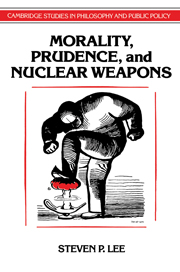8 - Conflict resolution
Published online by Cambridge University Press: 06 July 2010
Summary
Both rebuttals fail. The conclusion of the prima facie argument stands: Nuclear deterrence is not prudentially preferable to conventional deterrence. There is not sufficient reason to think that nuclear deterrence has substantial marginal deterrent value in comparison with conventional deterrence. In this sense, nuclear deterrence does not work. This seems to show that prudential revisionism is the correct approach to resolving the two conflicts, the sharp divide between institutional morality and prudence and the moral dilemma within the context of everyday moral reasoning. The apparent implication is that it is our prudential view, rather than our moral view, that nuclear weapons require we rethink. Nuclear weapons demand a new understanding of prudence, of what it prescribes, rather than a new understanding of morality. But it is, in fact, too soon to draw these conclusions. For prudential revisionism is the correct approach to resolving the conflicts only if the prima facie argument shows that the prudential and consequentialist arguments favoring nuclear deterrence are unsound. Despite the defeat of the rebuttals, however, the prima facie argument does not by itself show this.
Putting the point more carefully, the success of the prima facie argument does show that prudential revisionism resolves the conflicts, but only at an abstract level, not at a level of direct practical relevance, not at the level of policy implications for those situated, as everyone now is, in the midst of the nuclear age. Because the prudential and consequentialist arguments address the policy implications of nuclear weapons for nations situated in the nuclear age, the success of the prima facie argument is not sufficient alone to show that those arguments are unsound.
- Type
- Chapter
- Information
- Morality, Prudence, and Nuclear Weapons , pp. 293 - 334Publisher: Cambridge University PressPrint publication year: 1993

